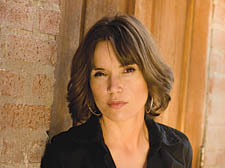|
|
 |
| |
How fancying a bloke took me into a war zone
Bored rigid by celebrity journalism,
Jane Bussmann set out to bag a man by covering a conflict in Africa. Now her mission is to expose the UK’s inaction faced with that continent’s suffering, writes Dan Carrier
The Worst Date Ever.
By Jane Bussmann. Macmillan £11.99
ASHTON Kutcher, Hollywood movie hunk and young squeeze to Demi Moore, sat opposite Jane Bussmann and turned on the star charm.
Kutcher was all hers to quiz over some top nosh in a swanky Hollywood eaterie. But for Jane, a former Parliament Hill School pupil turned celebrity gossip journalist, the chance to chew the fat was not a attractive proposition.
In fact, it was one lunch date too many.
The result is a new book that charts her disappointment with a job many journalists would cut their typing fingers off to bag, and how she set off to Africa – with no experience as a foreign correspondent – to uncover the truth about murder, mutilation, rape, civil war, corruption and the mass kidnapping of children who were forced to become soldiers in a brutal war.
It reads as an unlikely journey. Jane walked away from school with just an art A-level (“I spent too long eating Kit-Kats in the San Siro café in Highgate Road instead of studying,” she reveals) but got a writing gig through a friend of her father who was the Guardian’s wine critic. After a stint writing jokes for Radio 1 and Carlton TV, she went to seek the famous and fortunate in America. But, faced with Kutcher, she realised her time doing a gossip gig as over.
“It began in a Beverley Hills café in 2003,” she says.
“I was having lunch with the most fancied man in America and wishing I was dead. I’d reached that moment in your life where you see everything you’ve achieved, and in my case, it was being absolutely useless. My contribution to the planet was writing ‘Nicole [Richie] looks amazing’. It was either donate my organs to kidney patients – who, being in Beverly Hills, would probably reject them for not being famous enough – or escape LA and do something worthwhile with my life.
“Then I saw a photograph of a man in Vanity Fair who had made it his life’s work to end war in Africa. He was John Prendergast, the former White House director of African affairs. Now I knew the worthwhile thing I would do: I would try to cop off with him.”
Jane blagged an assignment with the Sunday Times to head to Uganda where John had been trying to broker a peace deal between the Lord’s Resistance Army and government forces, who were locked in civil war. Jane had a vision of John falling in love with her and the pair of them disappearing into an equatorial sunset.
“I planned to trick him into a romantic safari by tea time and propose marriage after some 48 hours,” she recalls. “Six weeks later I was not honeymooning but standing over a corpse in an open grave, wondering if I would get home alive.”
Instead of an interview with her dreamboat, Jane found herself unravelling a story that sheds an unflattering light on the United Nations, aid charities, the British government and both sides in this terrible war.
As Jane describes Uganda, it “...is in the middle of Africa, between Rwanda, the Congo and Kenya: genocide, genocide, coffee.”
When Britain withdrew as colonial ruler in 1962, ethnic tensions between north and south spilled over into violence. Dictator Idi Amin’s murderous reign ended in 1986 and the new president, Yoweri Museveni, took over with the backing of the US and Britain.
And this is where it gets murky. In 1987, religious fanatic Joseph Kony starts a civil war, kidnapping 20,000 children to use as soldiers, subjecting them to rape, murder and mutilation.
As Jane discovered, 20 years on, he is still out there and up to his old tricks – and, as her investigations uncovered, many of his commanders have gone over to the government side, and are doing nothing to stop these monstrous crimes. They have escaped retribution and are receiving cash from foreign aid groups.
Jane’s telling of this tale is unique. Her background as a comedy writer shines through – with the horror at the top of the agenda, she writes in a fresh-faced way: you laugh at her turn of phrase while being speechless at the grotesque behaviour of those she has in her sights.
Jane has used profits from the book to set up the Marty Singer Scholarship Fund – named after Ashton Kutcher’s lawyer who threatened her with a law suit after the star took umbrage at something she wrote – to pay for a plot of land for a woman who had been kidnapped and raped.
“What bugs me is she wasn’t the victim of a natural disaster,” says Jane.
“What happened was disgracefully preventable. The British government knew it was going on and went, ‘oh dear, isn’t it awful, but its far too complex to do anything about’.
The romance with Prendergast, which set this adventure off, did not happen. Instead, Jane turned it in to a backdrop for a one woman stand-up show and now book.
And although they haven’t set up home together, John has been supportive of her unconventional approach to writing about Uganda.
“He’s knocked out,” says Jane.
“We said there had to be a new way to tell people about stuff like Joseph Kony, other than the usual po-faced documentaries. I thought, sod it, I’m going to break the rules. It was so outrageous John had to laugh. However, I don’t think he was was expecting a book and stage show about how I fancied him,” she says.
“And we’re not dating. I’m into ambassadors now,” she jokes.
|
 |
|
 |
 |
|
 |
|


